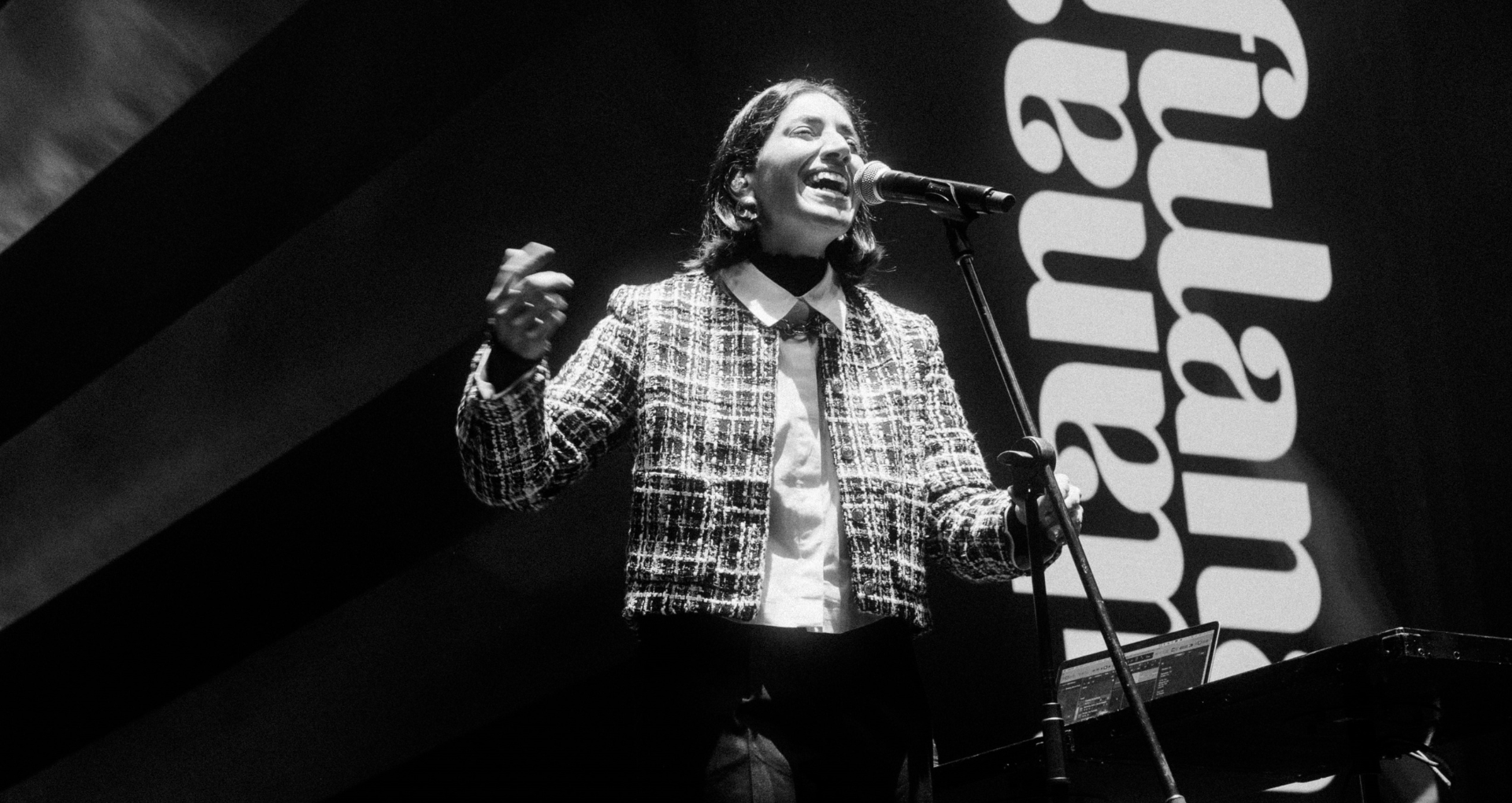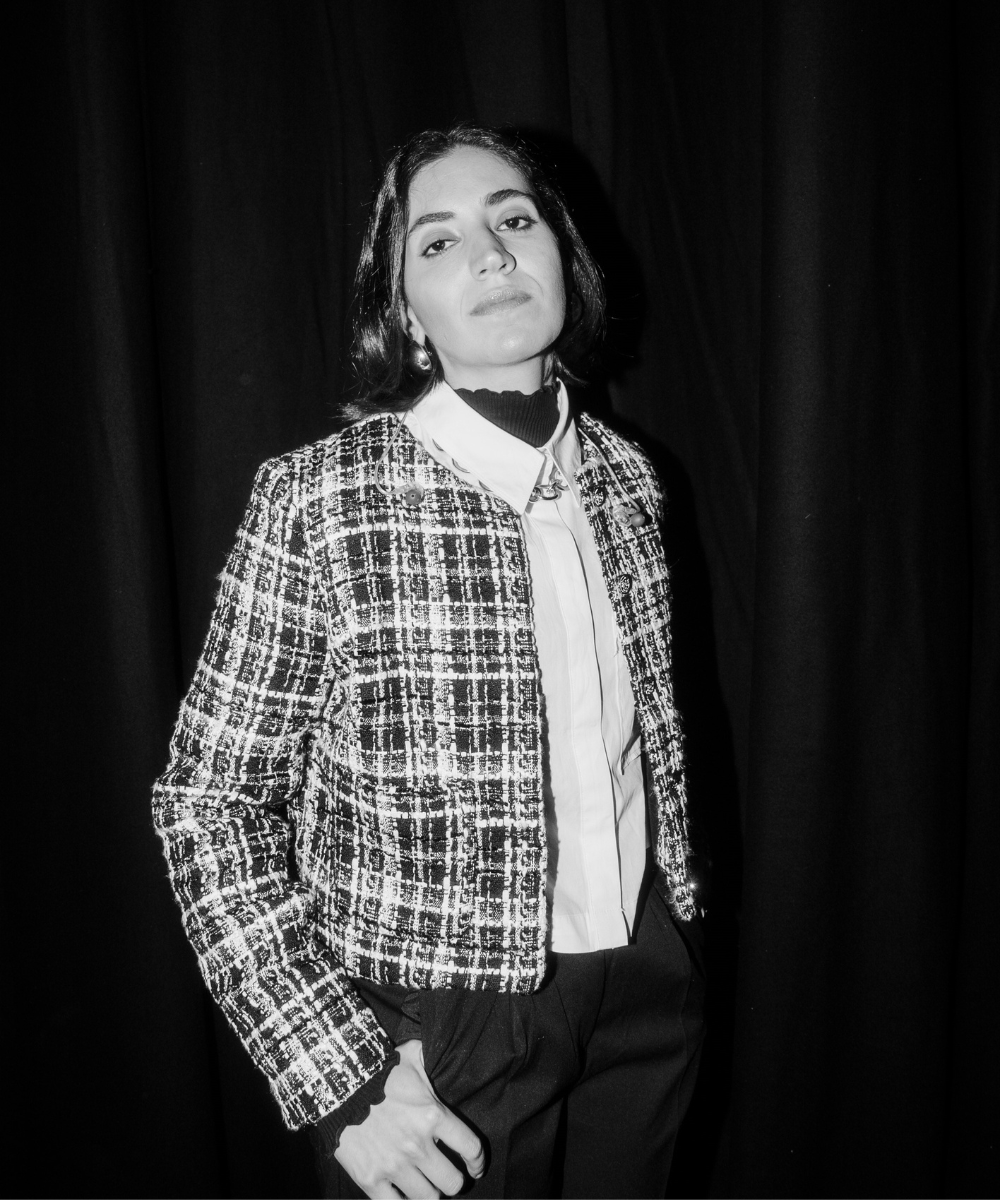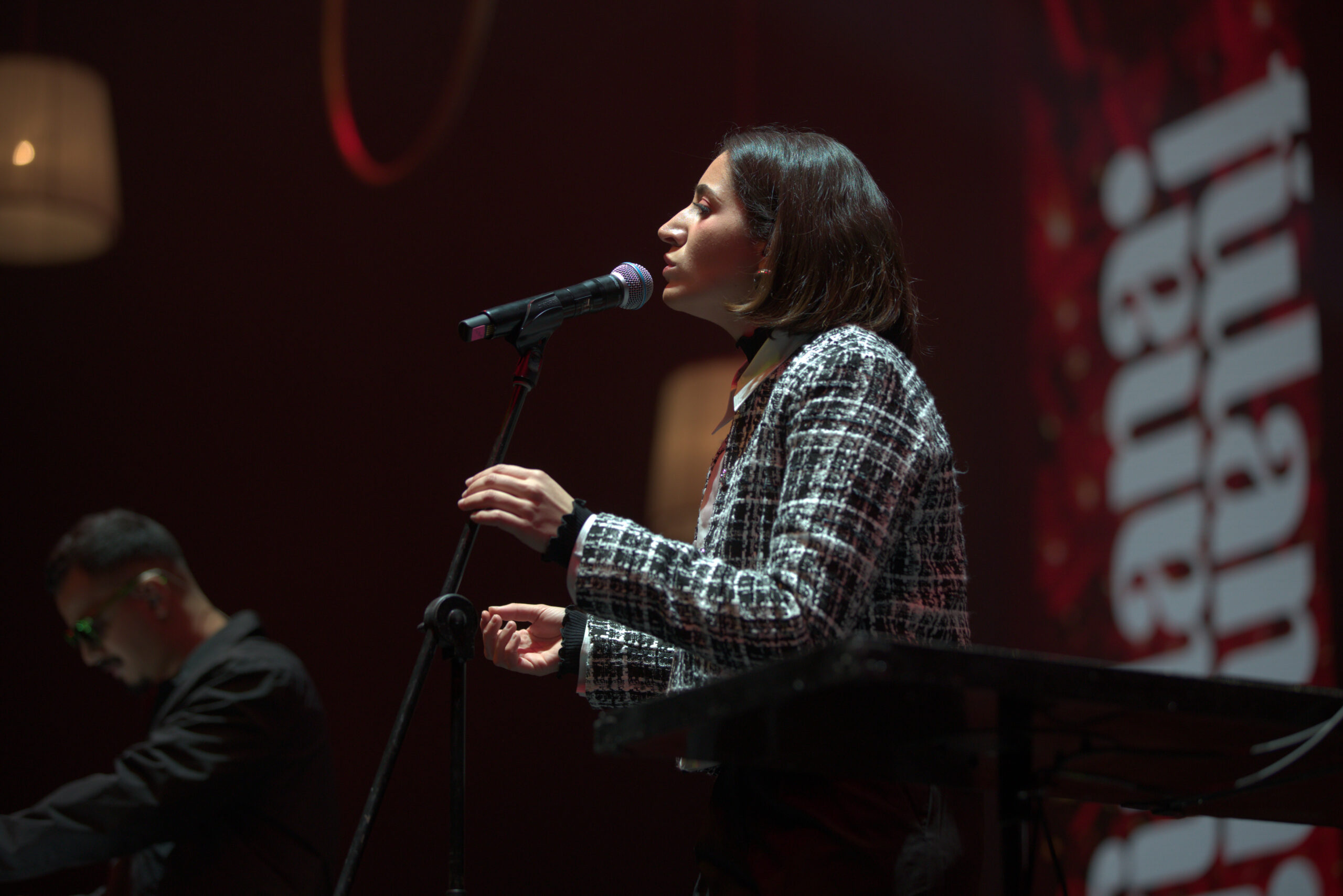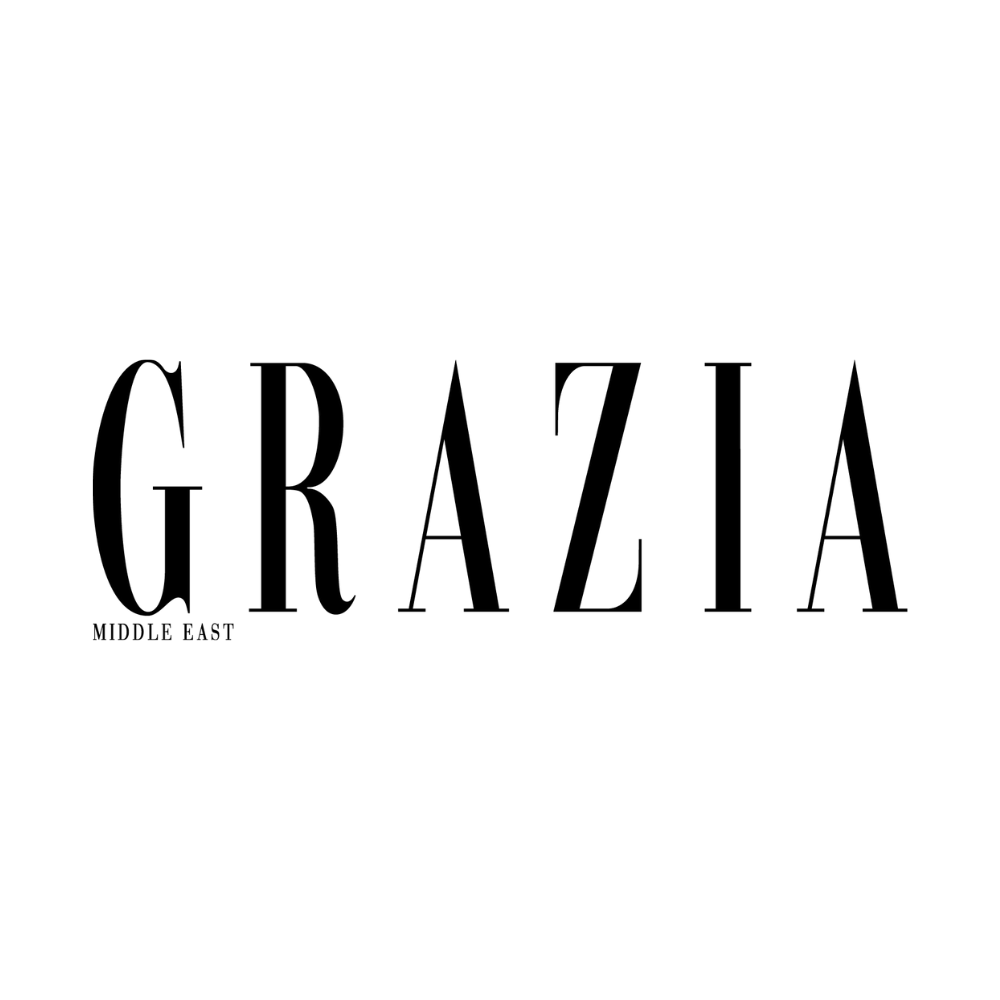
Earlier this month, Saudi Arabia saw the launch of the first-ever Riyadh International Jazz Festival kick off with a bang.
The enthralling event saw some of the world’s greatest artists, including Chaka Khan, headlining the scene along with emerging new talents. It was also a spectacle where an array of regional singers, including Saudi artist Fulana, who took to the stage to display their raw, unwavering talent.
For Fulana, whose real name is Nadine Lingawi, performing alongside the likes of Chaka Khan and Kokoroko was a complete “pinch me” moment.
“Standing on a stage like that at 29 years old, looking back at a passion that started and was kept secret from the age of 14, that’s a really long way. 15 years. I’ve been doing this for 15 years. It has been my only constant, my only point of birth and return,” she recalled in an interview with GRAZIA. “And to be on a stage with the likes of Kokoroko, The Cat Empire (who have inspired my music greatly), and Chaka Khan, Nadine at 14 wouldn’t believe it. And in Riyadh, of all places? Wouldn’t believe it. I think my only genuine thought is how excited I am for all the younger girls growing up in a country like ours today.”
The inaugural Riyadh International Jazz Festival was powered by the Saudi Music Commission, which is on a mission to support the development of the thriving music sector in the Kingdom, nurturing the up-and-coming artists of the region. And it’s no doubt they’re certainly on that path.
And Fulana herself is an exemplification of that. Post-Jazz Festival, the 29-year-old Saudi singer sat down with GRAZIA to discuss everything from her creative process to the vulnerability in her music and how she’s not afraid to tackle important issues head-on.
GRAZIA: As a Saudi Arabian artist, how do you feel about being part of the Riyadh Jazz Festival, considering the cultural significance of jazz music?
Fulana (F): Taking part in Saudi’s first Jazz Festival was an honour. Although I myself am an indie electronic pop artist, rather than a Jazz musician, just being able to open in an event of that calibre and stand on the same stage as some of the biggest names in history (Chaka Khan!) was a feeling that will forever be etched into me.
GRAZIA: Your music is often described as “dark and thought-provoking.” Could you elaborate on the themes and inspirations behind your songwriting?
F: For quite some time I found myself stuck in the topic of loss of love. As someone who uses music as more of a coping mechanism rather than a fulfilling pastime, it was my refuge during moments of heartache. However, it seems there comes a shift when one loses what could be considered the love of their life, a somewhat dissociation that happens when one realises how small we are in a universe as vast as ours. You start waking up, that is, to issues of the world when your rose-tinted version of reality falls apart. I think that’s what my current work discusses; more social issues, more conversations with higher beings and shadow selves. I am more in tune with the grains of sand than I am with interpersonal issues at the moment.

GRAZIA: Coming from Jeddah, how has your upbringing and environment shaped your musical style and identity as an artist?
F: My unpopular opinion would be that Jeddah was born a city of art. As a people, we really are a melting pot of different cultures and backgrounds in Jeddah, with each of our families originating from an extremely vibrant and colourful part of the world. I wouldn’t say I was born into art, my family is quite the scientific one, but how could you grow up next to the sea and not be moved to express yourself? Our underground art scene, though more visual than musical, is really the bedrock of our city.
GRAZIA: Your single “Ya Thalam Ya Kabes” launched earlier this year. Can you talk us through this milestone moment? What’s the message and meaning behind the song?
F: I don’t really refer to releases as milestones; once the music is released, it is no longer mine but rather the world’s to consume and emotionally claim. However, I will say it was a proud moment for me to release a track of that level of honesty. In “Ya Thalam Ya Kabes (Oh Suppressive Darkness)”, describes my journey with Bipolar Disorder, really using imagery and references to memories that express the extreme highs and lows that are associated with this mental state. It’s one of the boldest and most exposing pieces I’ve ever written. It also is my first track really speaking up against the social expectation of conformity.
GRAZIA: As a singer-songwriter and producer, what challenges have you faced in the music industry?
F: Since Fulana has started growing at a faster pace with more shows and bigger stages, the pressure and expectation of social media presence has been quite a challenge. It can be infuriating to someone who genuinely cares about craft to turn art into “content”. This idea that a musician is required to be a product/ brand is still something I’m finding difficult to understand because as much as I do not care for numbers, the industry, locally, still heavily relies on popularity over actual content. I find that a copy of a copy in a sea of copies is less inspiring.
Also, not to make this a gender issue, but I would definitely love and encourage to see more women in the industry. There is no doubt that even with the changes happening on a governmental level in the country, as a woman in the music industry, this route comes with many social sacrifices. Still, without sounding too biased, there’s a certain quality to music created by women that just drives me forward and inspires me. There’s a softness, a boldness, a tenderness, and harshness, a balance I find that mostly women can achieve. We need more of that; I need more of that.
GRAZIA: Jazz has a long history of serving as a medium for social commentary and expression. How do you see your music contributing to conversations or movements within Saudi Arabian society?
F: I think as someone who grew up in Saudi, everything from the way I speak, the way I think, and the way I present myself is an extension of our way of life. The topics I discuss may not be topics that are Saudi specific, nevertheless, they aren’t topics that are encouraged to openly discuss. For example, I grew up believing one shouldn’t speak of love and heartache, that it was an extremely private matter that wasn’t up for sharing. I find that to be incredibly isolating and lonely. Through my music, I openly express big emotions hoping, in a way or form, my listeners feel some strength in sharing or at least less alone. There is, however, a selfish part to every artist. Every song I write is for someone. I’m just hoping they’re on the other end of the line, listening. Everything I do, I do for them.

GRAZIA: Can you walk us through your creative process when writing and producing music? Do you have any rituals or habits that help you get into the right mindset?
F: I’m pretty sure it’s clear how hopeless a romantic I am. And hopeless my romances have been. My process starts with discomfort, a feeling that is extremely difficult to sit with. Usually, I’d start with a word or phrase that describes the feeling but I try not to put the feeling into too many words so as not to limit myself in the beginning. The music production process is where I really unload; my projects can have up to 50 layers of sounds, sometimes even muted layers of voice notes and solo conversations. Little textured sounds I bring in here and there, I tell the entire story through music and sound. Once everything is out, we start the process of elimination; muting and deleting layers to make a song a song rather than a sound experience. My last step is to bring back the phrase and start the writing and vocal melody determination simultaneously. In short, I cry a lot, I feel a lot, I make a lot, I share very little.
GRAZIA: The Riyadh Jazz Festival provides a platform for both local and international artists. How does it feel to be representing Saudi Arabia in such a diverse musical landscape?
F: It terrifies me to think I might represent anything of anyone other than myself. So allow me to answer as if the question was “how does it feel representing a younger version of yourself who never thought it was possible?” To that I answer, again, an honour. Standing on a stage like that at 29 years old, looking back at a passion that started and was kept secret from the age of 14, that’s a really long way. 15 years. I’ve been doing this for 15 years. It has been my only constant, my only point of birth and return. And to be on a stage with the likes of Kokoroko, The Cat Empire (who have inspired my music greatly), and Chaka Khan, Nadine at 14 wouldn’t believe it. And in Riyadh, of all places? Wouldn’t believe it. I think my only genuine thought is how excited I am for all the younger girls growing up in a country like ours today. How boundless their dreams can be, how limitless they are.
GRAZIA: What are your hopes for the future of music in Saudi Arabia, and how do you see yourself contributing to its growth and recognition on a global scale?
F: As a musician generally, it feels like I’m on an expedition team of uncharted territories. There aren’t that many women in music in Saudi, let alone in indie and more contemporary genres. I may be the wrong artist to ask about global impact and scale, I don’t care much for what the world wants to say or what they want their narrative to be. I care about my region; the younger people, the minorities, the silent ones, the lonely ones, the super intelligent but really weird ones. I care about my people. And if I can make it realistic to exist in an industry like mine just by being my nerd-star wars-loving-introvert that really loves music, so can anyone with something to say.









